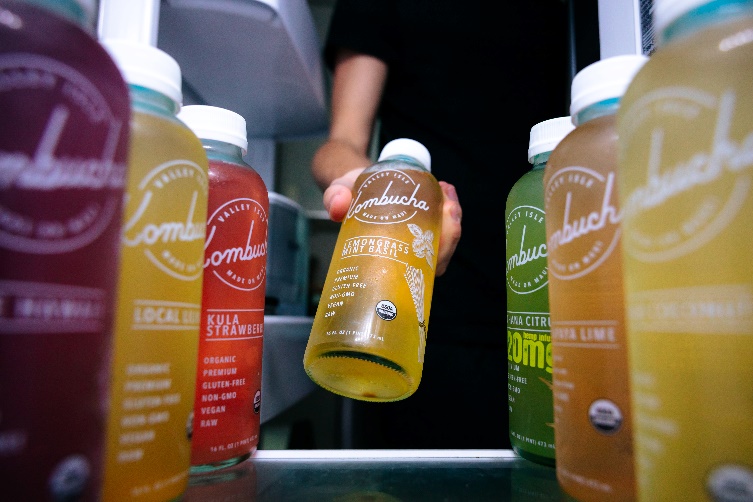 New research has shown that certain gut bacteria can play a significant role in the accumulation of visceral fat (aka belly fat, or the hidden fat which surrounds your organs like the liver and intestines). The bacteria in your gut help you digest food, and specific diet nutrients and gut bacteria affect the accumulation of fat in different ways. For example, protein and cholesterol were shown to be associated with increased visceral fat, however, Fiber, Magnesium and Vitamin E tend to be linked with lower visceral fat. Essentially, the food you eat can influence which microbes stay in your gut, which in turn can have an effect on how much visceral fat you have.
New research has shown that certain gut bacteria can play a significant role in the accumulation of visceral fat (aka belly fat, or the hidden fat which surrounds your organs like the liver and intestines). The bacteria in your gut help you digest food, and specific diet nutrients and gut bacteria affect the accumulation of fat in different ways. For example, protein and cholesterol were shown to be associated with increased visceral fat, however, Fiber, Magnesium and Vitamin E tend to be linked with lower visceral fat. Essentially, the food you eat can influence which microbes stay in your gut, which in turn can have an effect on how much visceral fat you have.
Carrying extra visceral fat can pose significant health risks, including things like:
- Type 2 diabetes
- Heart disease
- Dementia
- Cancer
- Asthma
- Liver disease
- High blood pressure
- Gall bladder disease
- Gout
- Osteoarthritis
Swapping out typical processed foods for more whole foods can help you modify your microbiome to potentially reduce visceral body fat. Here are some foods you can incorporate into your diet to help:
Apple cider vinegar - ACV helps digest fats, carbs, and protein because it helps your body create hydrochloric acid (HCL). It can also help relieve acid reflux.
Kombucha- No, you probably won’t catch a buzz (though some people have reported it), but it is packed with probiotics. You can even make it at home if you want to go that route, but seeing the SCOBY is not for everyone.
Yogurt – Live yogurt is packed with probiotics, but you should probably opt for something low in sugar. There are also many dairy-free yogurts like soy, almond, rice milk, and coconut milk which offer the same benefits in terms of good bacteria.
Kefir – Kefir is popular in Eastern Europe, and is like a more liquid, tart yogurt. Kefir usually contains around 10 live strains of bacteria (where most yogurt have around 3).
Sprouted Grains – The process in making sprouted grain products (like bread) makes it easier for some people to digest (some people with gluten intolerance can even have this kind of bread). Bonus: most sprouted grain breads and products are lower in carbs!
Speaking of grains – A diet with whole-grains can increase the variety of gut bacteria, so incorporate things like whole wheat, bulgur, and oats.

Coconut oil – Contains fatty acids like lauric acid and caprylic acid which can help kill off harmful yeast and bacteria, all while restoring the acidity level of your stomach. Olive oil works similarly!
High Fiber Nuts – Like almonds, walnuts, and pecans can help your gut bacteria break down foods but also can increase the abundance of a few specific bacteria which help out your gut microbiome.
Peas – They’re full of soluble and insoluble fiber, which can help keep your system in balance. Peas are easy to incorporate into your diet by adding them to soups, salads, stir-fries, or even alone as a side dish.
Leafy greens – Think spinach, chard, endive, and kale. They’re low calorie but high in fiber for their content, and they’re rich in vitamins and minerals. The good news is that they can be cooked down to get more bang for your buck.
 New research has shown that certain gut bacteria can play a significant role in the accumulation of visceral fat (aka belly fat, or the hidden fat which surrounds your organs like the liver and intestines). The bacteria in your gut help you digest food, and specific diet nutrients and gut bacteria affect the accumulation of fat in different ways. For example, protein and cholesterol were shown to be associated with increased visceral fat, however, Fiber, Magnesium and Vitamin E tend to be linked with lower visceral fat. Essentially, the food you eat can influence which microbes stay in your gut, which in turn can have an effect on how much visceral fat you have.
New research has shown that certain gut bacteria can play a significant role in the accumulation of visceral fat (aka belly fat, or the hidden fat which surrounds your organs like the liver and intestines). The bacteria in your gut help you digest food, and specific diet nutrients and gut bacteria affect the accumulation of fat in different ways. For example, protein and cholesterol were shown to be associated with increased visceral fat, however, Fiber, Magnesium and Vitamin E tend to be linked with lower visceral fat. Essentially, the food you eat can influence which microbes stay in your gut, which in turn can have an effect on how much visceral fat you have. Coconut oil – Contains fatty acids like lauric acid and caprylic acid which can help kill off harmful yeast and bacteria, all while restoring the acidity level of your stomach. Olive oil works similarly!
Coconut oil – Contains fatty acids like lauric acid and caprylic acid which can help kill off harmful yeast and bacteria, all while restoring the acidity level of your stomach. Olive oil works similarly! 

